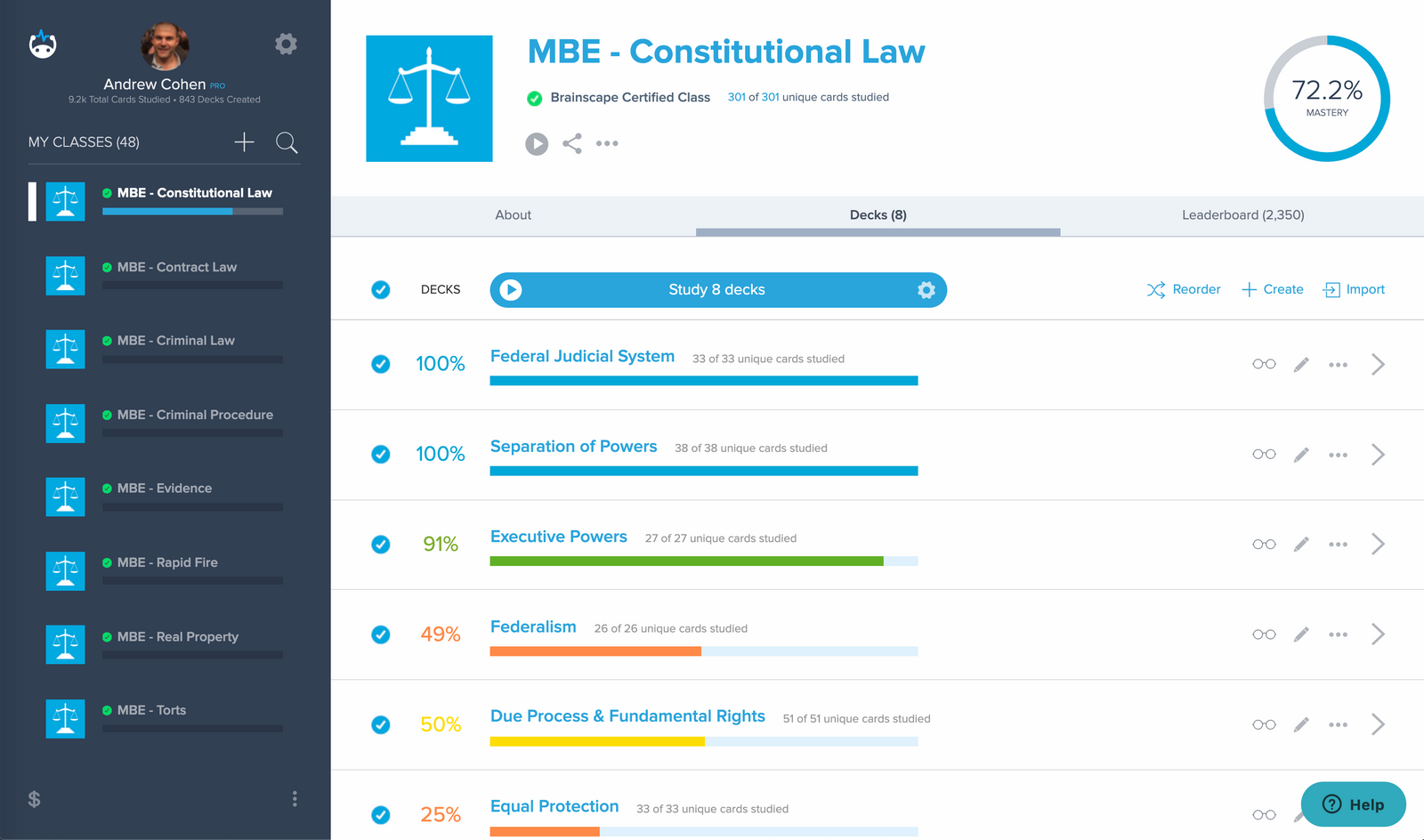Oops! You did it again.
Except you’re not Britney Spears and this isn’t 2004 ... so it’s just not sexy.
One of the highest, unwritten codes in education is the earlier you start studying for an exam, the better. Cramming doesn't work.
You knew that. But you’ve left your studying to the last minute and now your exam is looming over you with the menace of a tax deadline (or the Wednesday morning after Tequila Tuesday).
What you DON’T need right now is a slap on the wrist. You need a saving grace. And we’re here to give you one ... well, sort of. You have a lot of work ahead of you!
We here at Brainscape are obsessed with learning and the most time and energy-efficient ways students can do this. Through decades of cognitive science research, we have discovered that by working with (rather than in spite of, or even against) the brain’s cognitive hard-wiring, you can optimize your learning, taking HALF THE TIME you might ordinarily need to study.
This is exactly what you need right now!
To help you salvage the situation (because even top students have made the mistake of leaving things to the last minute), here's your “how to cram for a test” study guide. In it, we assume that you have little more than a day or two to prepare.
Follow these steps and you can pass.
You might not perform brilliantly—but our advice will help you make the most of the short time you have left. (And if you have even more time, you might want to also check out our complete guide to studying more efficiently so you won't need to cram in the future!)
Your emergency guide for how to cram for a test
Step 1. Determine what’s of critical importance
Cut your study material down to only the bare essentials. The easiest way to find out what that is is to just ask your lecturer: “Hey, what should I really be focusing on for the test? Any tips?”
They’re obviously not going to give everything away—heck, they might not give anything away—but they might throw you a bone: “Focus on this chapter, make sure you understand that concept, etc.” Some instructors might even provide their own explicit study guide for the test.
Failing that:
- Ask your educator what chapters the test assesses (they’re hardly going to deny you that information).
- Ask your fellow students what they think is important (the more opinions the better).
- Look at old tests and exams for guidance (more on this later!).
Narrowing down what you need to study can remove quite a bit of work from your plate. It’s worth a shot but don’t expect miracles at this late juncture.
Step 2. Create a study bubble, ASAP!

Now, more than ever, eliminating distractions is paramount! Choose a place where you can hole up for hours of distraction-free studying, out of the way of friends, family, roomies, and needy pets.
Now IS NOT the time to:
- Study with others. Remember that group studying is not very efficient, and you’re all about being as efficient as possible with the time you have left.
- Study in social spaces like coffee shops, where you can be seduced into people watching or talking to the attractive person next to you.
Now IS the time to:
- Become a study hermit (it’s only for a day or three: you’ll live).
- Turn your phone OFF and any other devices that distract you with notifications. If you’re using your device to study, e.g. the Brainscape app, set it to airplane mode once it’s synced.
- Gather together the necessary sustenance (water, coffee, snacks, etc.) Hunger and thirst can be super distracting. Also, you can use snacks as micro-rewards when you reach certain milestones.
For more tips on getting in the zone, check out Brainscape’s articles: How to find motivation when you want to procrastinate and How to concentrate when you just can't seem to focus.
Step 3. Use Brainscape’s flashcards to cram for your test

Brainscape’s web and mobile flashcards app is specifically tailored to help students learn TWICE as efficiently as traditional, passive studying (in other words: reading and re-reading your textbook and study notes). So, using our flashcard learning platform is probably the best way you can cram for your test; although, as always, we recommend preparing well in advance!
For starters, Brainscape has an extensive library of already-made flashcards for a staggering diversity of subjects, from astronomy to zoology and the WSET to the bar exam. Many of these are Brainscape-certified, which means that they have been put together by leading subject-matter experts. Others have been made by our users, with the best flashcard collections migrating to the top of the search pile. There might be user-created flashcards organized specifically for your class or textbook.
The Brainscape library is a great place to start because it saves you from having to make your own flashcards. The most important material has already been condensed so you can dive right in. Also, our spaced repetition algorithm (NNL) will ensure that the flashcards you struggle with the most are repeated at just the right intervals to help you learn them!
Step 4. Make flashcards JUST for the important concepts you don’t know well

If you can’t find what you’re looking for in our library, make your own flashcards but ONLY for the most important concepts you don’t know all that well. Don’t waste a minute of your time on anything less than what’s critical.
How do you determine what’s important?
Refer to the teacher's study guide if you have one. Your study notes (or those borrowed from a more diligent peer) and textbook will point you in the right direction too. Be on the lookout for:
- Already-highlighted words and phrases in your book or notes.
- Summary bullets and questions at the end of each textbook chapter.
- Bolded vocab words. Remember, many multiple choice questions have answer choices that are simply one word each, so know what they all mean.
What about the essay questions?
This is probably the area in which you’re going to suffer the most because essays contain a lot of facts and narratives that take longer to learn.
Having said that, sometimes, educators are willing to give credit just for name-dropping the right keywords in response to a question. So, even if you don’t have time to gain the full conceptual understanding, it’s worth trying to learn the key facts and basic narrative of the material.
Also, if you do get posed an essay question that you simply don’t have a comprehensive answer to, don’t give up: MAKE IT UP! Seriously. Use your imagination and weave your own theories, trying to leverage as much of the subject as you remember. If you have time left in the test, what have you got to lose?
(Just don’t tell your professor we told you to.)
Step 5: Practice past exams, tests, and quizzes

Old tests and exams are the best possible source of insight into what you can expect from an upcoming assessment. They not only give you an idea of WHAT material is covered but also HOW this material is posed to you in question or essay form. So, get your grubby paws on as many of these as possible and practice.
Pro Tip: Use Brainscape to make flashcards out of the more difficult questions and practice those every chance you get: before you go to bed, on the bus in the mornings, and even on the can.
Step 6. Review the day/morning before the exam
With time being so precious, reviewing what you’ve already studied might seem like a luxury, but it’s not. It’s essential. Running through all your flashcards one last time before your test can critically refresh your memory, effectively preventing all that information from evaporating before the test.
It’s better to spend a little time reinforcing what you’ve learned previously than to cover more ground and forget it ALL.
Lesson learned ... hopefully

If there’s any feeling better than skipping out of an exam you’ve been dreading, it’s doing so knowing you did really well. And the only way to do that is to prepare, which means consolidating your learning as you go along and not leaving it for the last minute.
You know this. I know you do. But if you do end up getting a good grade on the test you crammed for (hopefully thanks, in part, to this guide), try not to let the experience be positive reinforcement that cramming works for you.
While you may think you work better under pressure, there’s also an element of luck involved (getting asked questions you happened to study). Also, you’ll never live up to your full potential by cramming for a test. It’s as simple as that.
So, in the immortal words of Britney Spears: get to work b*tch!
For golden advice on how to prepare better for exams, check out these Brainscape study guides:
- How to build strong study habits
- How to study effectively with LESS total effort
- Getting motivation to study when you want to procrastinate
